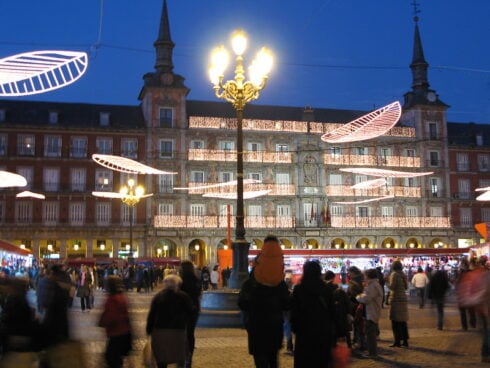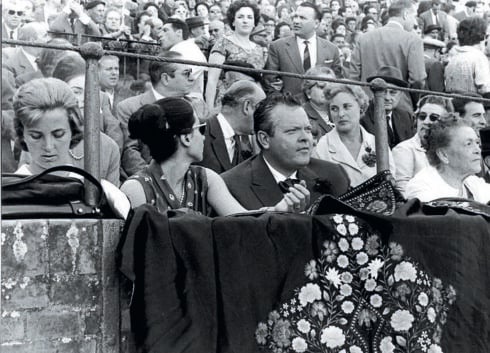I SIT in the car opposite two palm trees and in my hand is a photo from 1997.
It’s a surreptitious, snatched image of a man sitting alone in a bar.
He’d be older now, fifteen more years at the fag-end of life, when recognition can become harder by the month.
The person who gave me the photo thinks the subject is alive, living with 90 years of memories somewhere in this street.
This is Lindasol, a smart-ish residential area to the east of Marbella.
The sea is a mile down the hill.
I’ve been here for hours, waiting, looking at this photo.
The man is drinking a beer, staring with what I choose to see as melancholy into the distance.
When I check my mirrors, there’s been some movement in the apartment block behind me.
An old man is now sitting in the garden opening a book.
He looks up with curiosity at my approach. I guess his age. It’s possible.
I ask in stumbling Spanish if this man knows Wolfgang Jugler.
“No”, he answers, calmly.
I look at his book. It’s German.
“OK”, I say, leave and then peek back when I reach the gate. He looks rattled.
On a whim I lift my phone and snap him as I drive off.
I drive clear of the development and each street between us brings more clarity and shame. I pull over. I look at the photo from 1997. It wasn’t him.
I look at the smudged photo on my phone, of an elderly man utterly baffled by this stray Scottish lunatic.
It wasn’t him. I turn the ignition and drive sheepishly on.
It’s not easy, Nazi hunting.
*
When the Nazis ran, many of them ran to Spain.
They called it Das Trampolin because from here they were sprung across to South American friendlies.
Yet many stayed.
Franco hid behind the protection afforded by overt wartime neutrality.
He welcomed Nazis, particularly those with questionable riches, and instigated a sheltering programme that some argue was never dismantled.
In writing my new novel San Carlos, I delved into the staggering level of Nazi emigration to Spain after the war.
I set my book in Ibiza, the Balearic Islands being a popular Nazi refuge, but here in Andalucia, well this was Nazi-On-Sea.
Wolfgang Jugler was the last head of Hitler’s personal bodyguard division.
He could well be alive, somewhere near those two palm trees.
Elsewhere in Marbella lived Norwegian Nazi convert Frederik Jensen, awarded the German Gold Cross by Hitler and tracked down by Norwegian newspaper Aftenposen in 2007.
He died last year, aged 90.
Aribert Heim, “Dr Death” of the Mauthausen concentration camp and wanted for multiple war crimes, was reportedly spotted in Ibiza in 2005.
Investigators think resultant media attention sent Heim to South America after decades in Andalucia, and Jensen was suspected of helping him flee.
I drive past Malaga airport, where Otto Remer arrived in 1994 after fleeing German charges of denying the Holocaust.
He settled in the nearby town of Elviria with the full knowledge of Spanish authorities.
As Chief of Security at Hitler’s barracks, Remer blocked assassination attempts against the Fuhrer, including the ‘20th July’ plot featured in the movie Valkyrie.
A Nazi loyalist until the end, his 1997 funeral programme showed him in full wartime uniform.
Among the guests was Wolfgang Jugler.
*
In the small village of Arriate I have a drink with the Olive Press.
In 2008 they received a strange phone call.
A German man in Elviria had found a bag of documents in the street.
Through the mass of papers, they tracked down the house of the late Remer where a female relative of the former Nazi was happy to show him around.
The article that followed got a big response.
In phone calls and emails, the paper heard many stories of tall, lean German men growing old on Andalucian beaches.
More than anything, people talked about the tattoos.
Members of the SS had their blood type tattooed on their inner arm. Lots of people talked about old German guys with either that tattoo or, more often, a mark where it had been removed.
People talked about it being almost like a game right up into the Seventies, spotting these men.
Reports came in of all-German communities that sheltered in surprising locations away from the coast and in places such as the wild Atazcea region.
The Olive Press discovered the areas where people could live unnoticed for decades. “The one mentioned most was Barranco Blanco.
*
Barranco Blanco, white valley, is a place built on rumour.
A hidden dip of pine forest somewhere near the town of Coin, it has a whispered history of Nazi intrigue.
During the war it was used as a secret meeting place for Franco, Hitler and Mussolini.
An army barracks was built and used by the Germans for clandestine SS training.
Following the war it became a fully militarised area, and the most secure of Spain’s Nazi refuges.
Visitors in the early 1970s describe German style homes openly flying the swastika and a German themed bar, before being escorted clear by armed guards which may or may not have been Danish Nazi sympathisers.
More recent descriptions talk of a difficult road and a few inhabited houses left.
Online, there are more tales of people who fail to find it than have done so.
Local maps are hopeless and Google gives a grey smear of nothing.
When I visit I find a watchtower that is built in a Bavarian style and guards a road that starts surprisingly well before reverting to rough gravel and dirt as it drops into the thickly wooded valley.
I soon spot the houses on the valley floor – German style, large, some occupied and some probably not.
I see a gap in the trees draws my attention.
On the other side of a ravine is an abandoned army barracks.
I stop at the watchtower and venture inside.
I walk through debris, bottles and newspapers, and climb the staircase.
From the platform the view stretches in every direction.
*
Somewhere in Spain, probably in Andalucia, there are a handful of men like Wolfgang Jugler.
Men who fought in a war six decades ago, who have lived perhaps three quarters of their lives in a country that was sought as spontaneous refuge.
That they avoided thorough investigation and fitting punishment is a matter of Spanish shame that will only grow when the country finally deals with its hidden Nazi history.
The photo of Wolfgang Jugler does not show a happy man.
There is always a price to pay for living on the run and the grind of daily subterfuge, no matter how bright the sunshine.
Yet, like the rest of his cabal, Jugler was afforded both freedom and a secrecy which would endure virtually intact to the present day.
It’s a secrecy that will soon come to a natural end, after it has granted one last favour.
We will never know when the last of the Spanish Nazis dies.
Click here to read more News from The Olive Press.









The great majority of these brave German men fought with honour for their country and committed no crimes. They left post WW2 Germany because they didn’t like living in an occupied country, it is as simple as that. They should be admired for their courage not disparaged by nonentities like you.
I was thinking the same.
They left their country to avoid being deservedly strung up for their invovement in an obscene organisation that grotesquely murdered millions of innocent people. Anyone defending this filth obviously belongs in the same camp. There were no noble warriors amongst Hitler’s henchmen, they all knew full well about and were complicit in his crimes. They then clutched what loot they could and fled to the protection of a similar criminal.
Low-T
I agree, these weren’t “ordinary” Germans. They fled because they were on the wanted list. One who was exposed lived in our street in Elviria. He had a vicious Alsation dog.
All the above article is true. Barranco Blanco is now a lovely spot with huge white rocks in a stream, fun for the kids.
At the end of WW11 in Europe these untermenschen should have been hunted down relentlessly whichever country they fled to and butchered without mercy. Sadly only the Soviets did this, sparing only those scientists they could use in their rocket programme. In the west the knowledge was supressed that hundreds of thousands of German and Austrian soldiers were kept as ‘payback’ slave labour in the Soviet Union for over 10 years at the end of the war.
There were many German/Americans that helped ‘the comrades’ to escape to Italy where the rabid anti-Semitic Pope gave them Vatican passports so they could go where they wanted.
Why was’nt Spain invaded by a battle hardened western allied army in 1945 and all the Fascists wiped out and the Republic re-instated, simple, proto-type Neo-Con American hatred of anything that was’nt capitalist to the core.
Sad but true – how different may Spain have been today – quien saves?
Stuart
The USSR was the only country that wanted to invade Spain.
Since before the Spanish civil war UK was interested in overthrowing the Republic, and gave hidden support to the Franco forces.
“http://en.wikipedia.org/wiki/Foreign_involvement_in_the_Spanish_Civil_War”